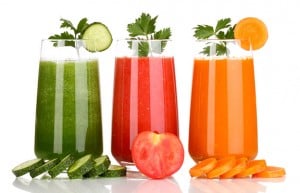 It seems that juicing is all anyone can talk about right now. Whether it be Beyoncé’s famous 3-day cleanse, the latest opening of your neighborhood’s juice bar, or the infinite reasons as to why kale is king-juicing has without a doubt become one of the most popular health fads trending throughout the media. Still, there is a lot of confusion surrounding this hot topic. Do cleanses really work? Is it better to drink your fruits and vegetables than to eat them?
It seems that juicing is all anyone can talk about right now. Whether it be Beyoncé’s famous 3-day cleanse, the latest opening of your neighborhood’s juice bar, or the infinite reasons as to why kale is king-juicing has without a doubt become one of the most popular health fads trending throughout the media. Still, there is a lot of confusion surrounding this hot topic. Do cleanses really work? Is it better to drink your fruits and vegetables than to eat them?
Juicing is an excellent way to obtain the nutrients from fruits and veggies in a compressed and delicious form. It is an efficient way to incorporate those essential vitamins and minerals into our diets without having to consume large bundles of dark leafy greens or cartons of berries. In addition, these juice elixirs often appeal to those who don’t really care for the taste of fruits and vegetables in their solid forms, thus it is easier for them to get their daily dose of greens in a glass.
Fruit and vegetable juices have just as many health benefits as their solid counterparts. For example, drinking juice daily can protect against cardiovascular disease, cancer and many inflammatory diseases. They are packed full of antioxidants which help to destroy cancer-causing toxins in our bodies. To add to that, juice can boost the immune system, clear up skin, and help people lose weight. The substitution of one’s morning latte with a fresh raw green juice will provide you with almost 200% more nutrients and natural energy.
Whether you prefer to pay for the convenience of juice made fresh for you at a juice bar, or commit to making your juice at home, it is recommended that you only buy/make the amount in which you intend to drink in that sitting. More specifically, fresh juice boasts its highest content of vitamins and minerals right after its transition from solid to liquid. After 72 hours, the majority of them are gone from the juice.
It is not a proven fact that juice is better for you than whole fruits and vegetables. Although it may be more convenient to consume, it does not have the fiber content that the solids do. One suggestion is to add the pulp of the vegetable/fruit to your juice to not only provide you with more fiber but to also fill you up longer. And although a juice cleanse may help you lose weight rapidly in the beginning, it is a healthy, well-rounded diet and consistent exercise regime that will ultimately keep your weight down-there is no permanent, quick fix to this.
Following are three juice recipes worth trying that are both delicious and nutritious:
The Green Machine-this juice boasts all the most nutrient rich veggies in one glass. Ingredients include: parsley, spinach, kale, celery, cucumber, lemon, apple.
Morning Burst-this juice will provide you with lots of natural energy and immunity-boosting vitamins. Ingredients include: carrot, orange, lemon, ginger.
Tropical Cooler-the taste of leafy greens in this juice are masked by the sweet and delicious tropical fruits. It is very refreshing and is a great option for someone who does not like the taste of vegetables and wants to incorporate them into their diet. Ingredients include: spinach, kale, pineapple, banana, coconut water.
http://www.doctoroz.com/videos/healing-properties-juicing
http://www.mayoclinic.org/juicing/expert-answers/faq-20058020
The information provided is for general interest only and should not be misconstrued as a diagnosis, prognosis or treatment recommendation. This information does not in any way constitute the practice of medicine, or any other health care profession. Readers are directed to consult their health care provider regarding their specific health situation. Marque Medical is not liable for any action taken by a reader based upon this information.

Favorite Platform

New Content




